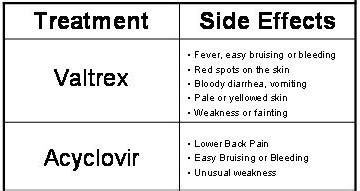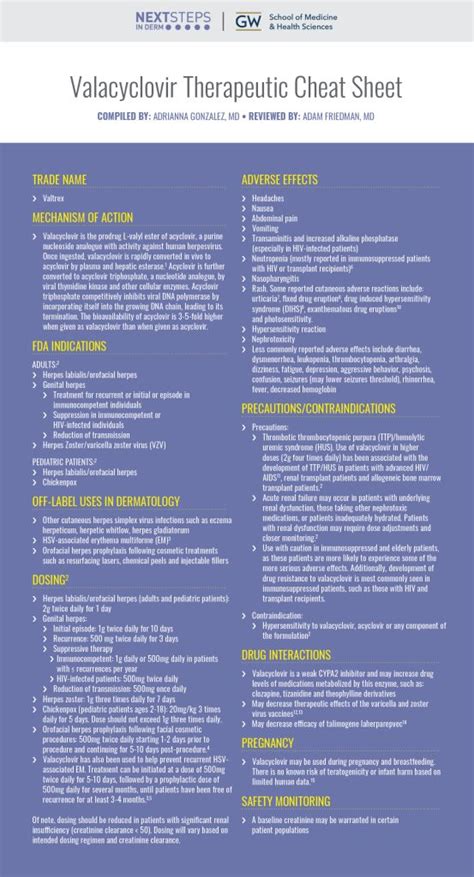Intro
Discover Valaciclovir side effects, including common and rare symptoms, interactions, and contraindications, to ensure safe treatment of herpes and viral infections, minimizing risks and adverse reactions.
The importance of understanding the side effects of valaciclovir cannot be overstated, as this medication is widely used to treat various viral infections, including herpes simplex and herpes zoster. As with any medication, valaciclovir can cause a range of side effects, some of which may be mild and temporary, while others can be more serious and long-lasting. In this article, we will delve into the world of valaciclovir side effects, exploring the common and rare effects, as well as the factors that can increase the risk of experiencing these effects.
Valaciclovir is an antiviral medication that works by slowing the growth and spread of the virus, allowing the body to fight off the infection more effectively. While it is generally well-tolerated, valaciclovir can cause a range of side effects, from mild and annoying to severe and potentially life-threatening. Some of the most common side effects of valaciclovir include nausea, vomiting, diarrhea, and headache, which can be uncomfortable but are usually not serious. However, in some cases, valaciclovir can cause more serious side effects, such as allergic reactions, kidney problems, and neurological symptoms, which require immediate medical attention.
The severity and frequency of valaciclovir side effects can vary depending on several factors, including the individual's age, health status, and dosage. For example, older adults and people with pre-existing kidney or liver disease may be more susceptible to the side effects of valaciclovir. Additionally, taking valaciclovir in high doses or for extended periods can increase the risk of experiencing side effects. It is essential to be aware of these factors and to discuss any concerns with a healthcare professional before starting treatment with valaciclovir.
What is Valaciclovir?

How Does Valaciclovir Work?
Valaciclovir works by being converted into acyclovir in the body, which then inhibits the replication of viral DNA. This slows the growth and spread of the virus, allowing the body to fight off the infection more effectively. Valaciclovir is most effective when taken at the first sign of symptoms, as it can help to reduce the severity and duration of the infection.Common Side Effects of Valaciclovir

These side effects are usually mild and temporary, and they can be managed with over-the-counter medications and home remedies. However, in some cases, these side effects can be more severe and require medical attention.
Rare but Serious Side Effects of Valaciclovir
While rare, valaciclovir can cause serious side effects, including: * Allergic reactions, such as anaphylaxis * Kidney problems, such as kidney failure * Neurological symptoms, such as seizures and confusion * Blood disorders, such as anemia and thrombocytopenia * Liver problems, such as liver failureThese side effects can be life-threatening and require immediate medical attention. It is essential to seek medical help if you experience any of these symptoms while taking valaciclovir.
Factors that Increase the Risk of Valaciclovir Side Effects

It is essential to discuss these factors with a healthcare professional before starting treatment with valaciclovir.
Managing Valaciclovir Side Effects
While valaciclovir side effects can be uncomfortable and inconvenient, there are several ways to manage them. These include: * Taking over-the-counter medications, such as antihistamines and pain relievers * Using home remedies, such as rest and hydration * Adjusting the dosage or frequency of valaciclovir * Switching to a different medicationIt is essential to discuss any side effects with a healthcare professional, as they can provide guidance on how to manage them and reduce the risk of more serious complications.
Valaciclovir Interactions

It is essential to discuss any medications with a healthcare professional before starting treatment with valaciclovir.
Valaciclovir and Pregnancy
Valaciclovir is generally considered safe to use during pregnancy, but it is essential to discuss any concerns with a healthcare professional. The medication can pass into breast milk, and it is recommended to avoid breastfeeding while taking valaciclovir.Valaciclovir and Breastfeeding

Valaciclovir and Children
Valaciclovir is generally considered safe to use in children, but the dosage and frequency may need to be adjusted based on the child's age and weight. It is essential to discuss any concerns with a healthcare professional before starting treatment with valaciclovir.Valaciclovir Overdose

If you suspect an overdose, it is essential to seek medical attention immediately.
Valaciclovir Withdrawal
Valaciclovir is not typically associated with withdrawal symptoms, but stopping the medication abruptly can cause a recurrence of the viral infection. It is essential to discuss any concerns with a healthcare professional before stopping treatment with valaciclovir.Valaciclovir Alternatives

It is essential to discuss any alternatives with a healthcare professional before starting treatment.
What is valaciclovir used for?
+Valaciclovir is used to treat a range of viral infections, including genital herpes, cold sores, and shingles.
What are the common side effects of valaciclovir?
+The most common side effects of valaciclovir include nausea, vomiting, diarrhea, and headache.
Can valaciclovir be used during pregnancy?
+Valaciclovir is generally considered safe to use during pregnancy, but it is essential to discuss any concerns with a healthcare professional.
Can valaciclovir be used in children?
+Valaciclovir is generally considered safe to use in children, but the dosage and frequency may need to be adjusted based on the child's age and weight.
What are the alternatives to valaciclovir?
+There are several alternatives to valaciclovir, including acyclovir, famciclovir, and valganciclovir.
In conclusion, valaciclovir is a widely used antiviral medication that can cause a range of side effects, from mild and temporary to serious and potentially life-threatening. It is essential to be aware of these side effects and to discuss any concerns with a healthcare professional before starting treatment with valaciclovir. By understanding the benefits and risks of valaciclovir, individuals can make informed decisions about their treatment and take steps to minimize the risk of side effects. We invite you to share your thoughts and experiences with valaciclovir in the comments section below, and to share this article with anyone who may be interested in learning more about this important topic.
